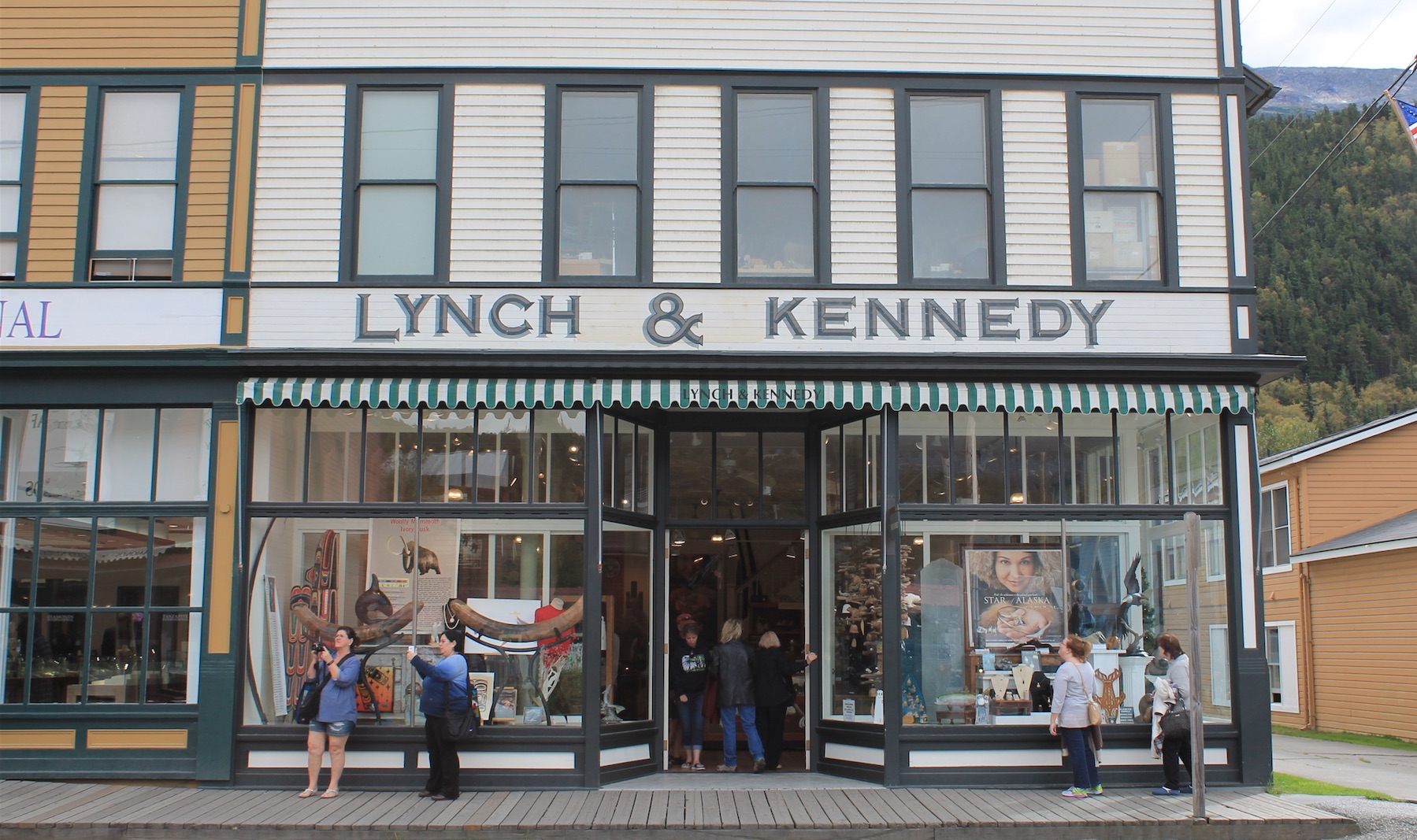“Mhmm,” is a slight hum of the lips usually in response to a question as a way of agreeing — that’s the argument federal prosecutors used in trying to prove a Skagway shopkeeper misrepresented art as Alaska Native-made.
But a jury wasn’t convinced.
Twelve members of a U.S. District Court jury in Juneau decided unanimously on Friday that Rosemary V. Libert, 56, was not guilty of misrepresenting Indian produced goods, which is a violation of the Indian Arts and Crafts Act.
Libert is the fifth person among Southeast Alaska shop owners or employees brought into federal court after an undercover U.S. Fish and Wildlife Service investigation named them as falsely selling art in their stores to tourists under the guise that it was made by Alaska Native artists. In court Friday, Assistant U.S. Attorney Jack Schmidt played portions of the audio the undercover agent recorded between his interaction with Libert on June 30, 2015 at her store Lynch & Kennedy Dry Goods.
[Two Juneau shop owners tied to Native art scam]
“So are we looking at a piece of Eskimo art?” the agent was heard asking in the audio recording. Schmidt argued that the two were both looking at a blanket toss carving that the agent knew before entering the store was crafted by Chupak, an artist of Cambodian descent who works out of Juneau.
“Yes,” Libert replied.
“This is a great Indian piece,” the agent later comments.
“Yeah, it’s pretty cool,” Libert is heard saying.
“So you know this artist? … So he would be like, ah, like an Alaska native?”
“Mhmm,” Libert replied.
“Perfect,” the agent said.
But defense attorney Michael Satin argued on behalf of his client that the exchange was far from perfect. Instead, he said in court that audio alone was not enough to be sure both Libert and the undercover agent were looking at the same piece while the conversation was carrying on. Also, he mentioned several times that the store was seeing an influx of customers and with background music playing, there was too much going on to know that Libert clearly understood the questions being asked by this seemingly curious tourist.
As proof that his client would normally be direct about the sales of Native and non-Native pieces, under less busy circumstances and with more clearly asked questions, Satin turned to an email exchange between Libert and the undercover agent one year prior when the agent used a different name to inquire about a piece by Chupak.
The agent made himself appear willing to buy the piece that was upwards of $2,000, then asked if it was an Alaska Native piece. Libert’s emailed response: “Chupak is NOT native indian or eskimo (Alaskan native).”
“You asked a direct question and a direct answer followed,” Satin told the agent on the witness stand.
“Mhmm,” the agent responded, then quickly said “yes” instead, realizing he was slipping into an unofficial but common form of agreement.
Satin argued that without more direct questions asked by the agent, and without a video recording to help follow along what was truly taking place, a not-guilty verdict was the only logical choice for jurors, even telling them it should take them no longer than five minutes to come to such a conclusion.
Prosecutor Schmidt countered that on three occasions that June day in the store, Libert heard the words “Eskimo,” “Indian,” and “Native,” and never once did it occur to her she should use clearer words with the person she was speaking with about the artwork he was about to buy. The Chupak carving of a blanket toss, which represents an Alaska Native tradition of holding animal skin within a circle of people while another person jumps in the middle as though on a trampoline, was not actually made by an Alaska Native artist. The burden is on the shopkeeper and other employees to make sure tourists are completely aware of those differences, Schmidt said in his closing statement.
“This law is a truth and advertising law to protect customers,” Schmidt said. “She let the assumption continue.”
More than an hour after deliberation, the verdict came back not guilty.
Libert’s was the only case of the five in the undercover USFW investigation to head to trial. Two Juneau shop owners, Norma M. Carandang, 60, with Northstar Gift Shop, and Vinod “Vinny” L. Sippy, 38, with Diamond Island, Icy Strait, and Gemstone Heaven, both pled out of their cases, agreeing to pay fines and make donations to the Indian Arts and Crafts board.
[Guilty plea ends Native art scam in Juneau]
Puerto Rican resident and Ketchikan business owner Gabriel T. Karim, 33, with Alaskan Heritage, appears to be in the final stages of a plea deal, according to online federal court records, while Judy M. Gengler, 65, a seasonal employee for Libert, seems to have had her case dismissed by prosecutors.
• Contact reporter Paula Ann Solis at 523-2272 or paula.solis@juneauempire.com.
Read more news:
Two hospitalized as Ketchikan forfeits over safety concerns
This misleading photo spread in Marie Claire shows Mendenhall Glacier completely gone

